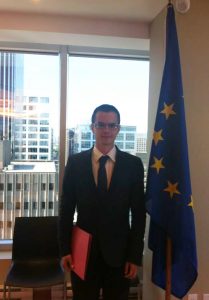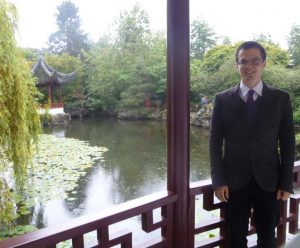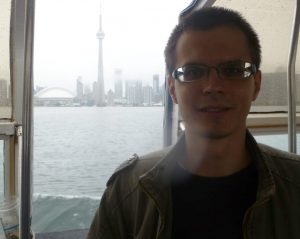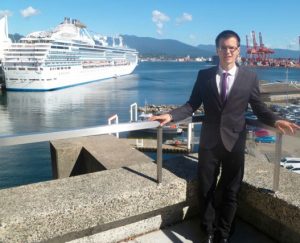January 31, 2014
By Miklós Horváth
 In September 2013, I got a chance to take part in a special academic program, called the EU-Canada Study Tour and Internship Programme – “Thinking Canada” to broaden my horizon on the functioning of EU institutions in Brussels and to visit six, probably the most spectacular cities in Canada, namely Montreal, Quebec, Vancouver, Victoria, Toronto and Ottawa. The program took 32 students from 23 of the 28 Member States of the European Union to Belgium and Canada; it was organized by European Canadian Studies associations and largely funded by the European Commission. In this brief report, I will outline what I have learned while I was in Canada; will explain my understanding of the vibrant cultural atmosphere of the country; and the complexity of Canada’s current political, social, cultural and economic landscape. Last but not least, I will share some of the experiences I have had not only throughout the program but also during my internship at the Portage Rehabilitation Centre in Elora, Ontario. This internship was offered to me for a period of two months before the study tour started.
In September 2013, I got a chance to take part in a special academic program, called the EU-Canada Study Tour and Internship Programme – “Thinking Canada” to broaden my horizon on the functioning of EU institutions in Brussels and to visit six, probably the most spectacular cities in Canada, namely Montreal, Quebec, Vancouver, Victoria, Toronto and Ottawa. The program took 32 students from 23 of the 28 Member States of the European Union to Belgium and Canada; it was organized by European Canadian Studies associations and largely funded by the European Commission. In this brief report, I will outline what I have learned while I was in Canada; will explain my understanding of the vibrant cultural atmosphere of the country; and the complexity of Canada’s current political, social, cultural and economic landscape. Last but not least, I will share some of the experiences I have had not only throughout the program but also during my internship at the Portage Rehabilitation Centre in Elora, Ontario. This internship was offered to me for a period of two months before the study tour started.
For me, Canada did not seem to be a barely populated country, i.e. a huge landmass with only thirty-five million inhabitants, but rather a cultural hotspot accommodating both traditional and modern cultural treasures produced by people coming from all corners of the globe while uniting the diversity of all these values under the concept of multiculturalism/interculturalism. In my opinion today’s Canada can definitely be considered to be a forerunner in supporting the active interaction and intercultural dialogue between people with all kinds of differences and as such it could serve as an example for the EU seeking to advance integration and the cohabitation of its citizens. Canada, with its considerably large amount of resources, has an edge on providing opportunities and future for those who feel comfortable living in a truly unique multicultural setting and a responsible society. The legal structures and provisions are set up to ensure the safety and security of all the citizens and smaller communities, and to clearly define the competences of the federal and the provincial governments while illuminating the structures and the dynamics in Canadian politics.
 During the trip, representatives of the federal, provincial and municipal administrations fully explained the distribution of legislative powers between the many orders of government while emphasizing the different regulations in migration policies and educational matters of Quebec, Ontario and British Columbia and the exclusive federal jurisdiction in areas such as taxation, banking or criminal law. Experts from Ontario, Quebec, British Columbia and the federal government all offered a comprehensive overview of the benefits of the CETA, a Comprehensive Economic and Trade Agreement between Canada and the EU, from their own political and economic perspectives. High-profile leaders extensively discussed the main objectives of the foreign policy of the federal government towards the United States, Latin America and China as well as the capacity of the government of Quebec to conduct international political and economic affairs in parallel with the federal authorities.
During the trip, representatives of the federal, provincial and municipal administrations fully explained the distribution of legislative powers between the many orders of government while emphasizing the different regulations in migration policies and educational matters of Quebec, Ontario and British Columbia and the exclusive federal jurisdiction in areas such as taxation, banking or criminal law. Experts from Ontario, Quebec, British Columbia and the federal government all offered a comprehensive overview of the benefits of the CETA, a Comprehensive Economic and Trade Agreement between Canada and the EU, from their own political and economic perspectives. High-profile leaders extensively discussed the main objectives of the foreign policy of the federal government towards the United States, Latin America and China as well as the capacity of the government of Quebec to conduct international political and economic affairs in parallel with the federal authorities.
While experts emphasized that Canada had a distinct foreign policy agenda, a flourishing export-based economy highly dependent on the U.S. market, an excellent healthcare system implementing innovative telemedicine solutions in remote areas to diagnose patients, and abundant resources offering a welcoming environment for both investors and immigrants, they also pointed out that there were certain areas where more measures should be taken. The recognition of professional qualifications of foreigners, the impact of the aging population on the economic development of society and the concerns of aboriginal people, such as their demands for indigenous land rights and some compensation for what they call the maltreatments experienced under the residential educational system are all among those challenges the various government authorities should face and address in a long-term strategy. The concerns of indigenous people were explained in detail by Inuit students, Grand Chief Ghislain Picard and lecturers at the Assembly of First Nations during the trip.
Besides learning about the political and economic landscape of Canada, I also got an overview of the complex cultural as well as the historical characteristics of the country. The link between language and identity was presented by Graham Fraser at the Office of the Commissioner of Official Languages and a long historical overview of the development of Canada was also provided at the Canadian Museum of Civilization, the War Museum, and the Arts and Letters Club. I believe the most spectacular parts of the tour were the visits to the Bombardier Airplane Assembly Plant to see the manufacturing of smaller aircraft, Vancouver’s Classical Chinese Garden and the Institute for Research on Public Policy in Montreal where we were able to pose several questions on social integration while highlighting our different national perspectives and backgrounds behind most of our concerns. It was also interesting to learn about the EU-Canada relations and to get a broad picture of the nature of such cooperation at the Delegation of the European Union to Canada in Ottawa and the EU Chambers of Commerce in Toronto.
 However, the tour enabled me to experience Canada not only from an academic perspective but also from a practical side through an internship program. In my internship program at the Portage Residential Rehabilitation Centre in Ontario I was actively involved in the daily tasks of a Canadian organization which provides facilities to substance abused adolescents, aged between 14 and 18, in four different locations across the country. Thanks to the EU-Canada Study Tour and the support of the Canada-Hungary Educational Foundation I was able to complete a 2-month internship at one of the most challenging sites of the organization, namely at the Elora branch in Ontario. The rehabilitation centre is residential in its nature, thus its mission is to build strong communities where residents can feel safe, are able to grow and can express their feelings in a comfortable manner.
However, the tour enabled me to experience Canada not only from an academic perspective but also from a practical side through an internship program. In my internship program at the Portage Residential Rehabilitation Centre in Ontario I was actively involved in the daily tasks of a Canadian organization which provides facilities to substance abused adolescents, aged between 14 and 18, in four different locations across the country. Thanks to the EU-Canada Study Tour and the support of the Canada-Hungary Educational Foundation I was able to complete a 2-month internship at one of the most challenging sites of the organization, namely at the Elora branch in Ontario. The rehabilitation centre is residential in its nature, thus its mission is to build strong communities where residents can feel safe, are able to grow and can express their feelings in a comfortable manner.
At Portage, I was involved in both the on- and the off-property activities of the male and the female residents. I taught them how to become responsible members of their own community, provided residents with seminars to broaden their perspectives on history, politics, culture and music, especially on contemporary world music, the functioning of the European Union, the philosophical ideas leading to European integration, and Hungary’s most remarkable landscapes, traditions and the language as well. Through my experiences at Portage, I learned how to be more open with my emotions and how to help others to express their feelings in an appropriate manner. I learned how to assist people in finding solutions to their problems and to develop positive thinking.
I enjoyed being part of a non-judgemental community, so to speak ‘a family’, where people showed care and empathy to most of the members regardless of their differences. They welcomed new residents with full support and without any prejudice. Close to the end of my internship, I was even invited to present my life story to the male residents who showed real interest towards what I was saying and had abundant questions regarding my past, my education and family background. Although I was engaged in conversations with all the residents, I mostly gravitated to the less fortunate because I felt that they needed more support than anyone else in the community. When one of these residents was discharged I was concerned about his personal development outside the community knowing his difficult past experiences with his parents and friends. Encountering a situation where a resident was not willing to put any effort into his personal development and was discharged shortly after his arrival, I learned that the excellent facilities Portage provided to each of its residents were not enough if the residents themselves were not willing to take their own parts, take a challenge and make serious efforts to change their lives and behaviours.
 In addition, I studied how Portage helps residents build structures in their lives. I was surprised how open they were for conversations even though they had serious issues to tackle and not the most pleasant feelings about their pasts. They stepped on pride, showed their real feelings and asked for help. I very much enjoyed the engagements between the residents at lunch time when they shared all of their burdens and problems with their fellow residents. At this particular occasion, I was able to understand the background of each of the residents and their concerns in the community. Most of the conversations at lunch addressed crucial issues, helped the personal development of the residents and were useful to create a warm environment.
In addition, I studied how Portage helps residents build structures in their lives. I was surprised how open they were for conversations even though they had serious issues to tackle and not the most pleasant feelings about their pasts. They stepped on pride, showed their real feelings and asked for help. I very much enjoyed the engagements between the residents at lunch time when they shared all of their burdens and problems with their fellow residents. At this particular occasion, I was able to understand the background of each of the residents and their concerns in the community. Most of the conversations at lunch addressed crucial issues, helped the personal development of the residents and were useful to create a warm environment.
Daily group meetings were held after lunch. The group meetings of the residents were the most useful to understand the method of treatment at Portage. This stage provided an opportunity for the residents to express their needs in the community (sometimes a fear about their future), do unburdening, find resolutions, represent personal developments and enhance a feeling of belonging to a community on a daily basis. Through these meetings, I understood the power of self-respect, the first stage to respect for other people, and the importance of taking responsibility and ownership for feelings, actions and opinions. I encouraged residents to maintain positive relations with peers. I understood the power of co-dependency in the life of drug addicts and their need for serenity. (At Portage, every day had its own ‘charm’ and challenge: both developments and difficulties occurred. One thing which really bothered me was that some residents wanted to stay at Portage just because they felt it was better than to be in jail.)
In my contribution to the institution I aimed to help residents understand why they ended up at Portage and what kind of values they were able to acquire by taking up the daily challenges. I tried to provide new perspectives to the residents, to open up their minds, and to broaden their knowledge and horizons.
I helped accompany residents to several off-property events, such as the Riverfest in Elora or a trip to Niagara Falls. Off-property activities were considered to be rewards and were provided to residents showing the best behavior in the community. I was engaged in discussions with residents, encouraged them to move forward and apply certain rules in their lives, understood their personal experiences and thus contributed to their emotional developments. I was also involved in sport activities, the chores and the training of the young members of the community. Providing seminars to the residents was a real challenge. It made me recognize my deficiency in regulating the behaviours of the participants. However, by the end of the internship, I studied how to create a proper learning environment.
What I especially appreciated at Portage was that all the staff members were helpful. The fact that many of them had professional training and went through similar experiences as the residents did, greatly enhanced the quality of treatment. I liked that most of the staff members did not act as authority over the residents but expressed their own feelings, truly shared their own experiences, so that the residents felt willing to turn to them with trust and confidence. They helped the adolescents grow and develop emotionally. Portage definitely provides excellent facilities to its residents, has a very committed staff and an effective treatment method. It trains its residents to be able to reflect on their actions and behaviours, and to study from their experiences but never return to the darkness and the shadow of death.
At the end of this brief account, I would like to thank the organizers of the program, Dr. Alexandre Berlin and Prof. Don Sparling, the Canada-Hungary Educational Foundation for providing a stipend to enable me to undertake the internship, my parents, Edit and Miklós, and my ‘Canadian family’, including Rose, Brian and Talia with whom I lived together in an amazingly friendly and supportive environment surrounded by natural beauties, the Gorge and the quarries of Elora. I would also like to express my hope that the European Commission and the various Canadian Studies associations will continue to support this valuable EU-Canada project in the future and that the Canada-Hungary Educational Foundation will again provide financial assistance for the internship of one or more Hungarian students in Canada.
Read our interview with Miklos while he was doing his internship in Canada.
